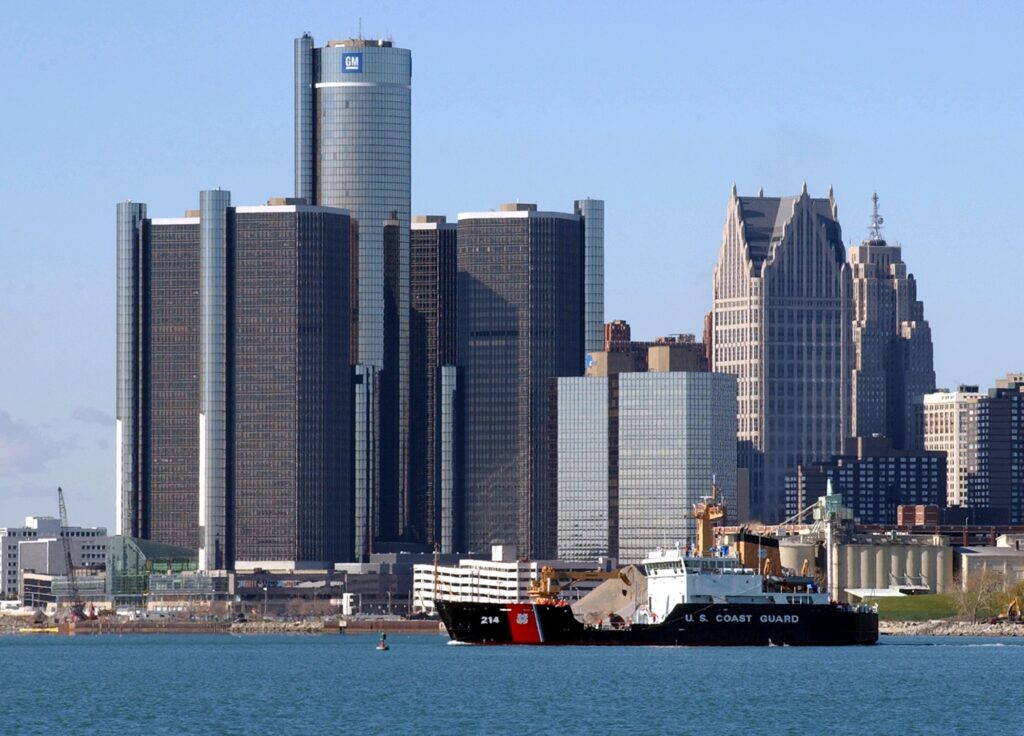“Detroit Police hope to bolster safety in the central business district by connecting a network of 350 security cameras to a central viewing post to track activity on the streets, search out wanted criminal suspects, check parking lots and monitor crowds.” – The Detroit News, August 14, 2011
In February 1996, my vehicle was broken into on a busy Saturday afternoon while it was parked on Fort near Shelby in downtown Detroit. Someone had used a spring-loaded device to burst the entire back window, allowing the burgling of a $25 office stereo. Thankfully, the considerate reprobate ignored at least $100 in books.
In the 15 years or so since my drama, crime has apparently worsened in downtown Detroit to such an extent police are planning to monitor the area with 350 cameras. One would think a former victim of crime would think this a good idea.
Not so fast.
Reason magazine’s Steve Chapman reported a year ago that Britain’s 4 million surveillance cameras resulted in no reduction in the nation’s crime, according to a 2005 government report. Chapman further reports San Francisco’s cameras “significantly reduced property crime while having no effect on violent crime, drug dealing, prostitution, or vandalism. So take comfort: When a mugger knocks you over the head, he won’t steal your hubcaps.”
Further, Chapman reported: “For every 1,000 cameras in London, less than one crime is solved per year,” with an “Average cost for cracking a case: $30,000.” Chicago’s 10,000 surveillance cameras assisted in the arrests of 4,000 perps since implementation in 2006, which Chapman writes “is not really a spectacular haul.”
To be fair, the Chicago numbers may reflect the camera’s effectiveness as a violent crime deterrent. In the further interest of fairness, it should be noted that London’s surveillance cameras enabled law enforcement officials to identify and capture four individuals to bomb the city’s subways in 2005.
The obvious benefits of surveillance in heavily trafficked areas such as downtown Detroit, however, comes at an exorbitant cost to citizens’ privacy – not to mention the apportionment of millions of taxpayer funds at the expense of more cops on the beat and lab equipment. As Chapman noted in another Reason article published this past February, “The challenge for enthusiasts is to show the technology outperforms other options.”
“If you’re not doing anything wrong then there’s nothing to worry about as the cameras deter those around you from breaking laws, thereby protecting you,” is a seemingly adequate defense against libertarian claims that the cameras present a serious violation of individual privacy. But this argument will only hold up until video footage of a nightclubber’s nosepicking winds up on Tosh.O or a website is established similar to “The People of Wal-Mart,” featuring the antics and apparel of downtown nightlife.
The Detroit News reported this past Sunday that “officers monitoring the cameras will be looking for wanted suspects. Trying to pick them out from a security camera image of a downtown street raises the real possibility of innocent citizens being abused in cases of mistaken identity.”
How many annoyed visitors to the city detained as a result of physical resemblances to real criminals would it take before bad word-of-mouth hampers any claims of the city’s reputation as a newly safe place to visit? Additionally, how many subsequent civil lawsuits over false arrests or charges of racial profiling must occur before legal expenses outweigh any benefits?
Current municipal surveillance video technologies are advanced enough to read books over a pedestrian’s shoulder, but neither is foolproof. The same holds true for identification software, which captured an image of a man removing his shirt on a New York street in 2010 who possessed no physical resemblance to the man eventually arrested for an attempted car bomb attack.
The biggest threat to liberty posed by police surveillance cameras, however, boils down simply to the complete removal of personal privacy rights in public places. The road to hell is paved with good intentions, and abandoning all precepts of personal privacy beyond one’s front door as the Detroit surveillance plan promises drives us closer to a similar albeit earthly destination.
Bruce Edward Walker is managing editor of The Heartland Institute’s Infotech & Telecom News.


